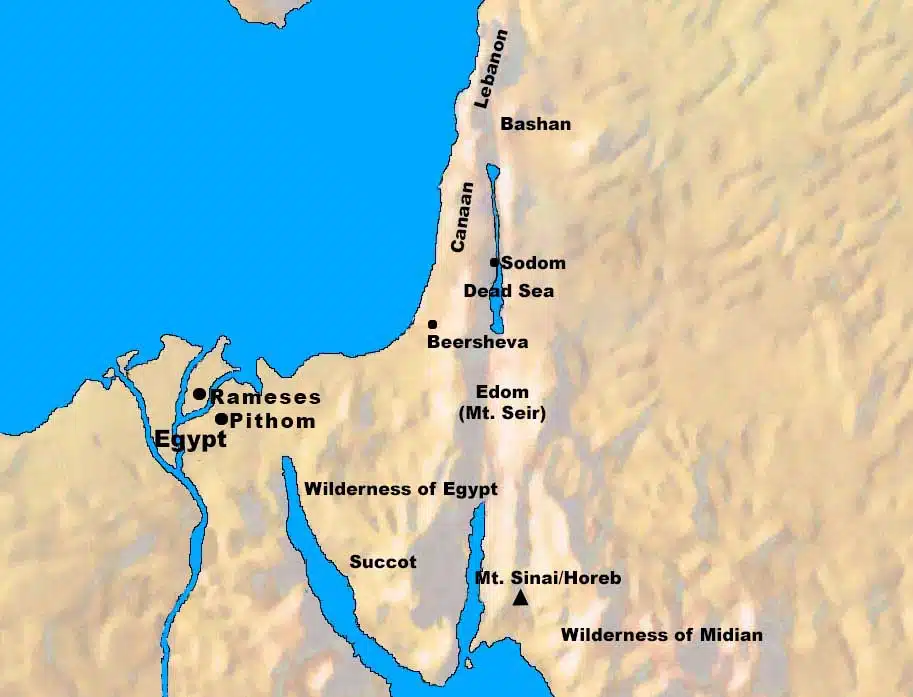In verses 6 – 8 is what the LORD commanded Moses to tell the Israelites. They need to be prepared for their deliverance that is about to happen, and He wanted them to believe that He will do what He says He is going to do in these verses.
The last two “I will” statements center around the idea of promise. This promise has two parts. In the sixth “I will,” the LORD says I will bring you to the land which I swore to give to Abraham, Isaac, and Jacob. The Hebrew for “I swore” is literally “I raised my hand,” signifying that the LORD took a solemn oath to give them the land. The second part of the promise has the LORD saying (in the seventh “I will”), I will give it to you for a possession. The sovereign LORD of creation who owns everything (Exodus 19:5) will give the promised land to Israel. So, the LORD will bring them to the promised land and give it to them, all of which is part of the covenant promises the LORD made with Abraham, Isaac, and Jacob.
He ends the seven “I will” statements with the declaration of who is making these promises – I am the Lord. Once again, in the Hebrew, this is simply “Yahweh.” Implied in this also is a message – Moses was not the deliverer of Israel, the LORD is. And the Great I Am of, author of all that is and well be, is now making Himself known. There is a difference between knowing the name Yahweh and knowing Yahweh, who He is and what He means. Ezekiel 16 details Israel’s rebellion and Yahweh’s unrelenting pursuit of them. After all of their disobedience, Yahweh establishes his covenant with them so that they “shall know that I am the Lord (Yahweh).”
To summarize this section, verses 6 – 8 described what the LORD is about to do for Israel. He articulates this in the form of seven “I will” statements:
- I will bring you out (verse 6)
- I will deliver you (verse 6)
- I will redeem you (verse 6)
- I will take you (verse 7)
- I will be your God (verse 7)
- I will bring you to the land (verse 8)
- I will give it to you (verse 8)
Moses obeys the LORD and spoke thus to the sons of Israel, hoping that the message the LORD gave him would encourage the Israelites. Sadly, however, they did not listen to Moses on account of their despondency and cruel bondage. The word “despondency” is literally “shortness of breath” in the Hebrew text. It means that the people rejected Moses’ message because they were exhausted and discouraged. Because of their disillusionment, they were in no mood to accept any message of hope, no matter the source.
Biblical Text
8 I will bring you to the land which I swore to give to Abraham, Isaac, and Jacob, and I will give it to you for a possession; I am the Lord.’” 9 So Moses spoke thus to the sons of Israel, but they did not listen to Moses on account of their despondency and cruel bondage.
Check out our other commentaries:
-
Romans 12:2 meaning
This verse shows that we live out God’s will when we change our thoughts to God’s thoughts. We live life to please God, rather than...... -
Genesis 9:14-17 meaning
When the rainbow is seen in the clouds, God will remember His covenant and the promise not to destroy all flesh by a flood again....... -
Matthew 1:9-10 meaning
In Matthew 1:9-10 Matthew continues the genealogy of Jesus from David through the succession of kings from Solomon to Jeconiah whose reign ended with the...... -
Exodus 30:11-16 meaning
The LORD describes what can be labeled as a “tabernacle tax.” Moses was to take a census and receive a “ransom” (a half a shekel)...... -
Exodus 39:22-26 meaning
The High Priest’s robe is constructed. It was made of blue material and decorated with pomegranates and gold bells. ......



